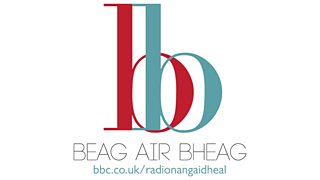Oisean a’ Ghrà mair Sreath 12: 1
CRIOMAG: Rachel Allan – Aois 60

1a. NAM, NAD, NA: in my, in your, in his/her/its
na mo (nam) bheatha - in my life
na do (nad) bheatha - in your life
na bheatha - in his life
na beatha - in her life
nar beatha - in our life
nur beatha - in your life (plural)
nam beatha - in their life
Note:
Cuir nam chuimhne. Remind me (‘Put in my memory’).
Cuir na chuimhne. Remind him (‘Put in his memory’).
Cuir na cuimhne. Remind her (‘Put in her memory’).
Cuir nan cuimhne. Remind them (‘Put in their memory’).
NA + fuaimreag (vowel), e.g. òige ‘youth, young years’; aonar ‘aloneness’:
nam òige - in my youth
nad òige - in your youth
na òige - in his youth
na h-òige - in her youth
nar n-òige - in our youth
nur n-òige - in your (plural) youth
nan òige - in their youth
nam aonar - in my aloneness (= on my own)
nad aonar - in your aloneness (= on your own)
na aonar - in his aloneness (= on his own)
na h-aonar - in her aloneness (= on her own)
nar n-aonar - in our aloneness (= on our own)
nur n-aonar - in your aloneness (plural) (= on your own)
nan aonar - in their aloneness (= on their own)
1b. THA MI NAM ... : I’m a ...
AUDIOCLIP: “Saoilidh mi nuair a tha daoine a’ fàgail dreuchd an toiseach gu bheil an tìde agus an t-saorsa as ùr na thoileachas agus gu bheil seòrsa de honeymoon period ann far a bheil sin dìreach na annas agus na thoileachas do dhuine sam bith.”
“I think when people leave a job initially the time and the new-found freedom is a pleasure and there’s a kind of honeymoon period where that’s just a novelty and a pleasure for anybody.
AUDIOCLIP: “Ach mar a tha thu ag ràdh, gu h-àraid ma tha thu cleachdte ri bhith trang, ri bhith dripeil, [saoilidh mi] gu bheil ùine a’ dol seachad agus gu bheil an tìde a th’ agad a’ fàs na uallach.”
“But as you say especially if you’re used to being busy, to being active, [I think] time goes past and the (free) time you’ve got becomes a burden.”
Tha mi a’ fàs nam uallach ort. I’m becoming a burden (‘in my burden’) to you.
Chan eil thu nad uallach idir. You’re not a burden (‘in your burden’) at all.
Chan eil e na uallach. He’s not a burden (‘in his burden’).
Chan eil i na h-uallach. She’s not a burden (‘in her burden’).
Bha caileag nan tattoos na h-annas anns a’ bhaile. The girl with (‘of the’) the tattoos was a novelty (‘in her novelty’) in the village.
Bha an gille na annas. The boy was a curiosity (‘in his curiosity’).
Bha iad le chèile nan annas aig an àm. They were both a novelty/curiosity (‘in their novelty/curiosity’) at the time.
Tha i na h-oileanach. She’s a student (‘in her student’).
Tha e na oileanach. He’s a student (‘in his student’).
Tha iad nan oileanaich. They’re students (‘in their students’).
2. CHAN ANN
AUDIOCLIP: “Chan ann airson gum bi duine glaiste ann an routine, ach uaireannan tha feum air beagan de routine airson cumadh a chur air an latha.”
“Not so that a person will be trapped in routine, but sometimes a bit of routine is needed to put some shape/structure on the day.”
CHAN ANN - NOT - Chan ann a-mhàin - Not just
Chan eil mi ag iarraidh dol a-mach a-nochd. Chan ann air sgàth na h-aimsir, ach dìreach gu bheil mi sgìth. I don’t want to go out tonight. Not because of the weather, just that I’m tired.
Chan ann gu bràth tuilleadh. Not forever.
Chan ann sa bhad. Not immediately.
Chan ann an-dràsta. Not just now.
Chan ann a-mhàin san Eòrpa ach air feadh an t-saoghail. Not just all over Europe but throughout the world.
Chan ann mar sin. Not that way, not like that.
Chan ann airson a’ chiad trup. Not for the first time.
(Faic Oisean 2 airson Chan e.)

